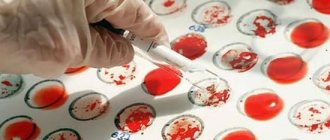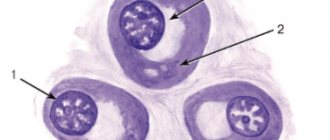Mendel's law
Mendel studied the transmission of genes from parents to offspring, as a result of which he made conclusions about how certain traits are inherited. He formalized these conclusions in the form of laws.
He learned that a child receives one gene from each parent, so a child in a pair of genes has one gene from the mother and the other from the father. In this case, the inherited trait may manifest itself (it is called dominant) or not manifest itself (it is recessive).
With regard to blood groups, Mendel found that genes A and B are dominant (they encode the presence of antigens on the surface of red blood cells), and gene 0 is recessive. This means that when genes A and B are combined, both genes will encode the presence of agglutinogens, and the blood group will be the fourth. If genes A and 0 or B and 0 are passed on to the child, then the recessive gene will not manifest itself; accordingly, in the first case there will be only agglutinogens A (the child will have group 2), and in the second - agglutinogens B (the child will have the third group) .
Paternity concept
So-called civil marriages are becoming increasingly common in the country. The main threat for women in such relationships is the non-recognition by the other party of the union of the child who was born in it.
Since a civil marriage does not lead to the formation of rights and responsibilities, a woman, if a man refuses to recognize the baby as his child, risks becoming a single mother.
However, even a registered relationship does not guarantee that the husband will accept responsibility for raising the child.
In some cases, this is due to the behavior of the woman herself (infidelity); in others, it is the desire of the stronger side of the marriage to avoid obligations towards the child.
A man’s lack of a sense of responsibility and the ability to recognize the consequences of his actions.
In both cases, the problem can be solved by establishing the paternity of the child. This term refers to the origin of a specific child from a specific man. Paternity relationships involve a blood connection between a minor and a man.
In the legal sense, paternity means an entry in the birth certificate, which determines the citizen who is responsible for the birth of a child and its further maintenance, development and upbringing.
AB0 system
This system for the typology of blood groups began to be used in 1900, when the presence in the blood (on red blood cells) of antigens, which were called agglutinogens, as well as antibodies to them, which began to be called agglutinins, was discovered. Agglutinogens are A and B, and agglutinins are designated alpha and beta. Possible combinations of such proteins create 4 groups:
- 0 (first) – contains alpha agglutinin and beta agglutinin.
- A (second) - contains beta agglutinin and A agglutinogen.
- B (third) - contains alpha agglutinin and B agglutinogen.
- AB (fourth) – contains A agglutinogen and B agglutinogen.
HYBRID OF ANGEL AND HUMAN – NEPHILIM
Many ancient texts, including the Bible, do support this theory. Many stories in ancient texts, especially pre-Christian ones, do talk about a race that came down from heaven to Earth. In the Bible, man saw them as gods, living long lives and performing miracles. In the Book of Enoch , which was never officially included in the Bible because it was considered idolatrous and too focused on the story of angels, the Nephilim and fallen angels are mentioned in detail.
How to find out what blood type a child will have from his parents (table)
You need to know your baby’s blood type already at the breastfeeding stage. The blood of the fetus and mother do not mix due to the placenta during pregnancy. But when feeding with breast milk, the conflict manifests itself in the form of hemolytic disease (jaundice, lethargy, tendency to bleed, poor reflexive development). May lead to unpleasant consequences for the baby.
A blood group is an individual set of red blood cells. Determined by various methods for identifying antigens (agglutinogens) on the surface of red blood cells and antibodies (agglutinins) in plasma.
There are two antigens that can be found in the blood: A and B, as well as antibodies alpha and beta. Depending on the compounds of these substances, four blood groups are distinguished:
They are determined in the following ways:
- Villous sampling of the embryonic part of the placenta (up to 4 months of pregnancy);
- Taking a sample of the liquid medium from the membranes in which the fetus is located;
- Taking a blood sample from the umbilical cord;
- Blood test of a newborn in the maternity hospital.
How do groups differ?
It turned out that some have antigens A and B on the surface of red blood cells (that is, molecules that are involved in the formation of immunological memory), others do not have them, and still others have only one type of these antigens.
- I (0) – there are no antigens in the blood of this group, neither A nor B;
- II (A) – there are only A antigens;
- III (B) – only B antigens are present;
- IV (AB) – both antigens are present.
Moreover, it is important that it is impossible to “lose” or “gain” any antigen during life6; the blood type remains constant from birth to death. Legends began to be created around each blood type: what activities do people with such blood like to engage in, what diseases are they predisposed to, how best to eat
Legends began to be created around each blood type: what activities do people with such blood like to engage in, what diseases are they predisposed to, how best to eat.
The influence of blood groups on human health and fate has not been scientifically confirmed. But it is still significant, and a person’s life may depend on it:
- Those who have the first blood group can only receive blood transfusions of this group, but carriers of any other blood group can receive this blood transfusion without fear.
- Holders of the fourth group are “omnivorous”: they will accept blood of any group, but their blood can only be transfused to owners of the same fourth group.
- Those with the second group can be infused with blood of the first or second group; their blood is suitable for the second and fourth groups.
- With the third group, the situation is similar to those who have it the second: this blood can be transfused into carriers of that third group and the fourth, they themselves will accept the blood of the first and their third group without any problems.
Karl Landsteiner divided red blood cells into two categories depending on their composition (the presence of antigens in them). The first category contains A antigens, the second - B antigens.
In addition, a separate group of red blood cells that does not contain antigens was defined as “0”. A little later, followers of the teachings of Karl Landsteiner discovered group 4, which contained antigens A and B.
What is Rh factor
An antigen protein may form on the surface of red blood cells (blood cells), but it may not exist.
Most of the population has a positive Rh factor. There are no differences between people with different Rh.
The Rh factor can be determined by analyzing venous blood. It does not change its meaning throughout life. There are only rare cases where, due to organ transplantation, this value could differ.
When a Rh negative foreign body enters an Rh negative body, the body perceives the protein (antigen) as an enemy and begins an attack against it. When receiving a blood transfusion or during pregnancy, the consequences can be fatal (death of the fetus or the person receiving the blood).
conclusions
Currently, medicine makes it possible to determine diseases by blood type that may appear in a child even before birth. Of course, you should not completely trust tables and independent research. Accuracy in determining the group and rhesus of the unborn child can only be expected after a laboratory study.
What is really worth paying attention to is the fact that using parental blood one can very likely determine the predisposition to diseases of the future child. One of the most important tasks when determining blood category is to reduce the possible risk of blood transfusion.
If alien genes enter the human body, an aggressive reaction may begin, the outcome of which is very sad. The same situation occurs with inappropriate rhesus
It is important to take these circumstances into account for pregnant women, especially those with a negative factor
One of the most important tasks when determining blood category is to reduce the possible risk of blood transfusion. If alien genes enter the human body, an aggressive reaction may begin, the outcome of which is very sad. The same situation occurs with inappropriate rhesus
It is important to take these circumstances into account for pregnant women, especially those with a negative factor
We should not forget about possible gene mutations that occur on earth to one degree or another. The fact is that previously there was one blood group (1), the rest appeared later. But these factors are so rare that it is not worth dwelling on them in detail.
There are certain observations regarding the correspondence between a person's character and his blood. From this, scientists drew conclusions about predisposition to certain diseases. Thus, the first group, being the earliest on Earth, seems to be the most resilient; among the people of this subgroup, leaders are most often found. These are pronounced meat lovers, but, unfortunately, they also have strong allergic reactions.
People of the second blood group are more patient and practical; they are most often vegetarians, also due to their sensitive gastrointestinal tract. Their immune system is weak and they are often susceptible to infectious diseases.
The third subgroup is represented by passionate natures, extreme sports people. They tolerate environmental changes better than others and have excellent immunity.
People of the fourth blood subgroup are the rarest, they are very sensual and see this world in their own way. They have a receptive nervous system and are often very altruistic.
Whether to trust such characteristics and whether to make predictions about the character of their child based on such observations is up to parents to decide. But using the achievements of modern medicine to improve the health of the unborn baby is never superfluous.
Rhesus conflict
Antibodies are generated in the blood and are designed to destroy a foreign body (antigen). This occurs during pregnancy or blood transfusion.
A woman who has a negative Rh factor must undergo a compatibility test with her partner before becoming pregnant.
Results:
- If both partners have a negative indicator, there will be no conflict.
- If the father is Rh positive, there is a risk of conflict.
In the early stages of pregnancy, it will be necessary to test for the Rh factor of the fetus. If he took Rh+ from his father, the pregnancy should be strictly under the supervision of doctors. There is a risk that the baby will be born with hearing defects, possibly anemia, and disruption of the brain. If the Rh of the fetus from the mother is negative, there will be no conflict.
The body will have matured elements to combat the positive protein. Accordingly, rejection will begin faster. Before planning a second pregnancy, consult your doctor.
Could there be incompatibility?
In the second half of the 20th century, after the definition of group 4 and the recognition of Rh factors, a theory describing compatibility was also developed. At first, this concept was used exclusively for transfusions.
The blood fluid administered must not only match the group, but also have the same Rh factor. If this is not adhered to, conflict arises, which ultimately leads to death. Such consequences are explained by the fact that when incompatible blood enters, red blood cells are destroyed, which leads to a cessation of oxygen supply.
When pregnancy occurs, it is also possible that there may be a blood conflict between the child and the woman. Such situations are predicted in two cases:
- The woman's blood is negative, and the father's is positive. Most likely, the baby will also have a value with the “ ” sign. This means that when it enters the mother’s body, her blood fluid will begin to produce antibodies.
- If the expectant mother has the first group, and the man has any other group except 1. In this case, if the child does not also inherit the 1st group, a blood conflict cannot be ruled out.
If the first situation arises, everything may not end with the most favorable consequences. When a fetus inherits Rh positive, the pregnant woman’s immune system will perceive the child’s red blood cells as foreign and strive to destroy them.
As a result, when the child’s body loses red blood cells, it will produce new ones, which puts a very noticeable load on the liver and spleen. Over time, oxygen starvation occurs, the brain is damaged, and fetal death is also possible.
If this is your first pregnancy, then Rh conflict can be avoided. However, with each subsequent one the risks increase significantly. In such a situation, a woman should be constantly monitored by a specialist. She will also need to have blood tests done quite often for antibodies.
Immediately after the baby is born, his blood fluid group and its Rh factor are determined. If the value is positive, the mother is given anti-Rhesus immunoglobulin.
The second option does not pose a threat to the baby's life. In addition, it is diagnosed extremely rarely and does not have a complex process. The exception is hemolytic disease. If you suspect the development of this pathology, you will need to undergo regular tests. In this case, for the birth to be successful, the most favorable period is considered to be 35-37 weeks.
Most experts say that with a higher value of father's blood relative to mother's, the probability of having a healthy and strong child is almost 100 percent.
If you conduct a timely examination, regularly visit a gynecologist and do not ignore the instructions of the attending physician, this will increase the likelihood of a successful conception, pregnancy and birth of a baby.
Inheritance of blood groups is not such a complicated science. Knowing all the subtleties and nuances, you can find out what group and Rhesus he will have even before the birth of the child.
Frequently asked questions and answers
The fourth is negative. Only 4.3% of the world's population has such a group.
You can find out most accurately only in laboratory conditions. A doctor who specializes in this will determine the group and Rh factor.
The main factors of incompatibility are Rh and blood group. It can occur if partners have different Rh factors: the man is positive, the woman is negative, or vice versa.
The most common blood type in the world is A. It is noteworthy that among Europeans the second group is considered the most common.
Many people are confident that a person’s character can really be determined by their blood type. Group 1 – people-hunters. Energetic and very purposeful. They have a strong character and always achieve their goals. Group 2 – very economical and hardworking. They are distinguished by pedantry and decency. They do not like noisy events and prefer to spend time at home. But at the same time, they easily make contact with other people and are very sociable. Group 3 – very emotional and suspicious. They love traveling, because sitting in one place for a long time is not at all an option for them. Dreamers and romantics. Group 4 – people who are philosophers. Pleasant, sociable and persistent. They are often hampered by a hot temper and arrogant emotionality. In the team they are often considered the soul of the company.
The first is negative, the second is negative and the third is negative. The rarest is 4 negative.
What to do if the situation is unfavorable?
When planning a pregnancy, expectant parents should contact specialists who will explain the importance of Rh factors and tell them how to proceed. Don’t worry, medicine has already come so far that there are solutions.
Currently, even for women who have a negative Rh factor, supervision of the entire period of pregnancy by specialists will allow them to become a mother and give birth to a healthy baby without any problems. Doctors correct the functioning of the maternal immune system with the help of medications.
The procedure for couples with different Rh factors is:
- visiting a therapist to receive a referral for tests;
- visiting a gynecologist and recommended specialists;
- in taking and obtaining the results of tests necessary to establish the degree of health of the couple and determine the blood type and Rh factors;
- in carrying out the vaccination measures necessary for the mother and unborn child.
So, since it so happens that the mother’s Rh factor is positive and the father’s is negative, this complicates the course of pregnancy, but does not put an end to your dream of having a child. Be optimistic, enlist the help of specialists and you will definitely succeed. Take care of yourself.










